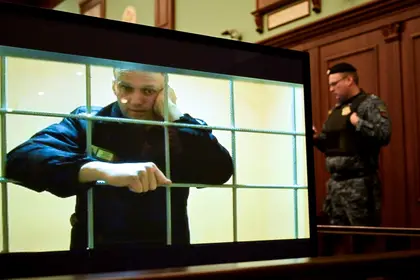A Russian court on Friday sentenced jailed opposition leader Alexei Navalny to 19 additional years behind bars on extremism charges, his spokesperson said.
"Alexey Navalny was sentenced to 19 years at a maximum security penal colony," spokesperson Kira Yarmysh said.
JOIN US ON TELEGRAM
Follow our coverage of the war on the @Kyivpost_official.
An AFP journalist watching the court session in a press centre at his prison said Navalny smiled as the judge read the verdict and hugged another defendant before the transmission was cut.
The most prominent Kremlin critic inside Russia over the last decade, 47-year-old Navalny was already serving a nine-year prison sentence near Moscow on embezzlement charges he and his allies contest.
He has campaigned across the country to be president, published corruption investigations that embarrassed the Kremlin and rallied massive crowds onto Russia's streets.
His message – pumped to fans through glitzy social media content – contrasts dramatically to that of Vladimir Putin, a Soviet-styled, 70-year-old former KGB agent who has ruled without compromise for over 20 years.
Navalny returned to Russia from Germany in early 2021 after recuperating from a near-fatal poisoning attack with Novichok, a Soviet-era nerve agent.
His return to Russia despite facing jail put him on a collision course with Putin, after Navalny blamed the poisoning attack in Siberia on the Kremlin.
"I'm not afraid and I call on you not to be afraid," he said in an appeal to supporters as he landed in Moscow, moments before being detained on charges linked to an old fraud conviction.

Washington Insider: US Congressional Hearings for Ukrainian Corruption?
His arrest spurred some of the largest demonstrations Russia had seen in decades, and thousands were detained at rallies nationwide calling for his release.
Putin 'fears me'
Navalny countered with the release of "Putin's Palace," an investigation into a lavish Black Sea mansion that his team claimed was gifted to Putin through corruption.
The expose forced a rare denial from Putin, who quipped that if his security services had really been behind the poisoning, they would have finished the job.
While Navalny traffics confidently in memes, Putin is known both for not using the internet and asking a teenager who wanted him to follow his YouTube channel: "What should I sign?"
A similar Navalny corruption video targeting then prime minister Dmitry Medvedev spurred large demonstrations in 2017, with protesters carrying rubber ducks which became a symbol of the protests.
Ahead of a presidential election in 2018, Navalny toured cities across the country to drum up support but was barred from running because of the old fraud charge.
"(Putin) fears me and he fears the people I represent," he told AFP at the time. Before that he had challenged Sergei Sobyanin to become Moscow mayor and forced a runoff.
'Crooks and thieves'
At rallies and in courtrooms, Navalny is a convincing public speaker and rallied protesters around home-grown slogans like "the party of crooks and thieves" to slam the ruling United Russia party.
But he has been tainted by an early foray into far-right nationalism, and a pro-gun video from 2007 routinely resurfaces in which he compares people from the ex-Soviet South Caucasus region to cockroaches.
Navalny also remains a fringe figure for a large portion of Russian society, who back the Kremlin's official portrayal of him as a Western stooge and convicted criminal.
Before he was sentenced in February 2020, he had become such a thorn in the Kremlin's side that Putin refused to pronounce his name in public.
His anti-corruption group was shuttered and his top allies are either imprisoned or in exile.
'Cannot shut my mouth'
Navalny's team says he has been harassed in prison and repeatedly moved to a punitive solitary confinement cell.
He says guards have subjected him and other inmates to "torture by Putin", making them listen to the president's speeches.
Still Navalny is upbeat and sardonic on social media accounts curated by aides.
The lawyer by training has fought for basic rights and taken prison officials to court.
He has also tormented them, filing formal requests for a kimono and a balalaika – a traditional musical instrument – and to be allowed to keep a kangaroo.
"You cannot shut my mouth," he declared.
You can also highlight the text and press Ctrl + Enter






